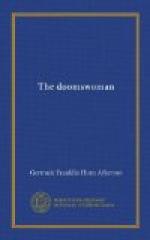“You know me,” said Estenega. “I owe half my power in California to the fact that I do not make a threat to-day and forget it to-morrow. You will show me where that gold is, or I shall kill you.”
“The servant of God dies when his hour comes. If I am to die by the hand of the assassin, so be it.”
Estenega leaned forward and placed his strong hand about the priest’s baggy throat, pushing the table against his chest. He pressed his thumb against the throttle, his second finger hard against the jugular, and the tongue rolled over the teeth, the congested eyes bulged. “It may be that you scorn death, but may not fancy the mode of it. I have no desire to kill you. Alive or dead, your life is of no more value than that of a worm. But you shall die, and die with much discomfort, unless you do as I wish.” His hand relaxed its grasp, but still pressed the rough dirty throat.
“Accursed heretic!” said the priest.
“Spare your curses for the superstitious.”
He saw a gleam of cunning come into the priest’s eyes. “Very well; if I must I must. Let me rise, and I will conduct you.”
Estenega took a piece of rope from his saddle-bag and tied it about the priest’s waist and his own. “If you have any holy pitfall in view for me, I shall have the pleasure of your company. And if I am led into labyrinths to die of starvation, you at least will have a meal: I could not eat you.”
If the priest was disconcerted, he did not show it. He took a lantern from a shelf, lit the fragment of candle, and, opening a door at the back, walked through the long line of inner rooms. All were heaped with rubbish. In one he found a trap-door with his foot, and descended rough steps cut out of the earth. The air rose chill and damp, and Estenega knew that the tunnel of the Mission was below, the secret exit to the hills which the early Fathers built as a last resource in case of defeat by savage tribes. When they reached the bottom of the steps the tallow dip illuminated but a narrow circle; Estenega could form no idea of the workmanship of the tunnel, except that it was not more than six feet and a few inches high, for his hat brushed the top, and that the floor and sides appeared to be of pressed clay. There was ventilation somewhere, but no light. They walked a mile or more, and then Estenega had a sense of stepping into a wider and higher excavation.
“We are no longer in the tunnel,” said the priest. He lifted the lantern and swung it above his head. Estenega saw that they were in a circular room, hollowed probably out of the heart of a hill. He also saw something else.
“What is that?” he exclaimed, sharply.
The priest handed him the lantern. “Look for yourself,” he said.
Estenega took the lantern, and, holding it just above his head and close to the walls, slowly traversed the room. It was belted with three strata of crystal-like quartz, sown thick with glittering yellow specks and chunks. Each stratum was about three feet wide.




